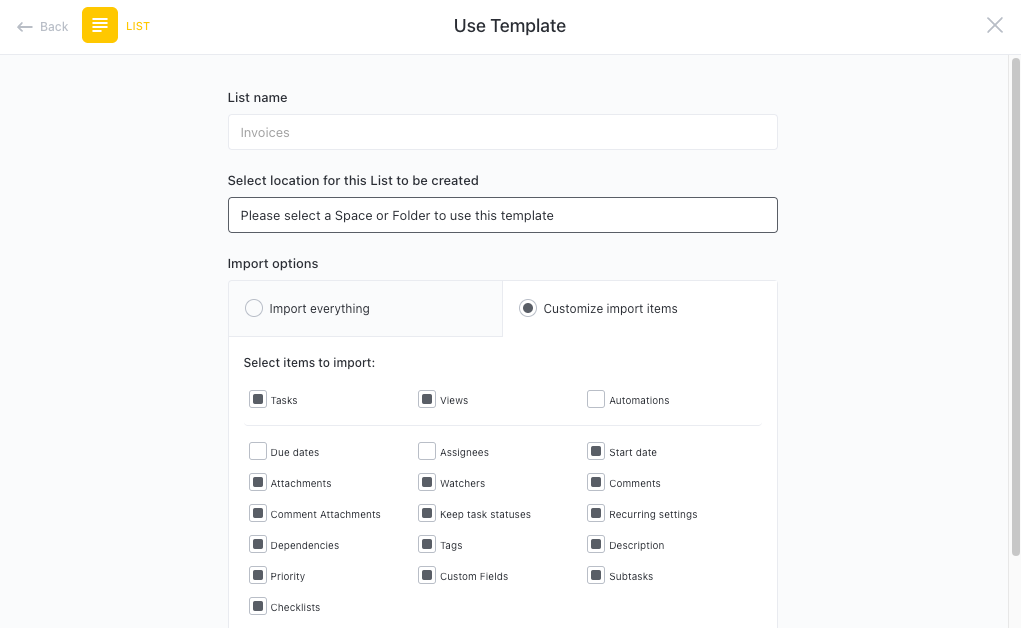Managing accounting projects can be a daunting task, especially when it comes to defining the scope of work. But with ClickUp's Accounting Scope of Work Template, you can streamline the entire process and ensure clarity from start to finish.
This template empowers you to:
- Clearly outline the objectives, deliverables, and timeline of your accounting projects.
- Define the roles and responsibilities of each team member, ensuring smooth collaboration.
- Set realistic expectations for your clients or stakeholders, avoiding any potential misunderstandings.
Whether you're working on financial audits, bookkeeping tasks, or tax preparations, ClickUp's Accounting Scope of Work Template is your ultimate solution for efficient and effective project management.
Don't let scope creep and confusion slow you down. Start using ClickUp's template today and take control of your accounting projects like never before!
Benefits of Accounting Scope of Work Template
When it comes to accounting, having a clear scope of work is essential for smooth operations. The Accounting Scope of Work Template offers numerous benefits, including:
- Streamlining communication between accounting teams and clients
- Ensuring that all parties have a clear understanding of the tasks and responsibilities involved
- Setting realistic expectations and deadlines for accounting projects
- Providing a framework for tracking progress and measuring success
- Enhancing accountability and reducing the risk of errors or misunderstandings
- Saving time and effort by eliminating the need to create a scope of work from scratch
Main Elements of Accounting Scope of Work Template
ClickUp's Accounting Scope of Work template is designed to streamline your accounting processes and ensure clarity in your scope of work. Here are the main elements of this Doc template:
- Custom Statuses: Use custom statuses to track the progress of your accounting projects, such as In Progress, Pending Review, and Completed.
- Custom Fields: Utilize custom fields to capture important information related to your accounting scope of work, such as Client Name, Project Start Date, Budget Allocation, and Key Deliverables.
- Different Views: Access different views to visualize and manage your accounting scope of work effectively. Some of the available views include the Overview view for a high-level summary, the Task List view for a detailed breakdown of tasks, and the Calendar view for scheduling and deadlines.
With ClickUp's Accounting Scope of Work template, you can streamline your accounting processes, track progress, and ensure transparency in your projects.
How to Use Scope of Work for Accounting Services
When it comes to creating an effective accounting scope of work, it's important to follow these steps:
1. Define the project scope
Start by clearly defining the scope of the accounting project. Determine what specific tasks and deliverables need to be completed, such as financial statement preparation, tax filing, or bookkeeping. Be as detailed as possible to avoid any misunderstandings later on.
Use a Doc in ClickUp to outline the project scope and ensure everyone is on the same page.
2. Identify the project timeline
Next, determine the timeline for completing the accounting project. Consider any deadlines or important dates, such as tax filing deadlines or financial reporting periods. Break down the project into smaller milestones to help track progress and ensure timely completion.
Use Milestones in ClickUp to set project deadlines and track progress at a glance.
3. Assign responsibilities
Assign specific responsibilities to team members or external accountants involved in the project. Clearly define who will be responsible for each task, such as preparing financial statements, conducting audits, or filing tax returns. This will help ensure accountability and avoid any confusion.
Create tasks in ClickUp and assign them to team members to clearly outline responsibilities and keep everyone accountable.
4. Determine the required resources
Identify the resources needed to complete the accounting project successfully. This may include software, financial data, access to accounting systems, or any other tools or information required. Make sure all necessary resources are available and clearly communicated to the team.
Use custom fields in ClickUp to track and manage the required resources for the project.
5. Establish communication channels
Effective communication is crucial for a successful accounting project. Determine the preferred communication channels for the team, such as email, meetings, or project management software. Set expectations for regular updates, progress reports, and any important discussions.
Utilize the Email and Chat features in ClickUp to streamline communication and keep all project-related discussions in one place.
6. Monitor and review progress
Regularly monitor and review the progress of the accounting project to ensure it stays on track. Schedule regular check-ins or progress meetings to discuss any challenges, make adjustments if necessary, and ensure that the project is meeting its objectives.
Use Dashboards in ClickUp to get a visual overview of the project's progress and easily track key metrics.
By following these steps and leveraging the features available in ClickUp, you can effectively create and manage an accounting scope of work, leading to successful project completion and accurate financial management.

Get Started with ClickUp's Accounting Scope of Work Template
Accounting professionals can use this Accounting Scope of Work Template to ensure a clear and organized scope of work for each client.
First, hit “Get Free Solution” to sign up for ClickUp and add the template to your Workspace. Make sure you designate which Space or location in your Workspace you’d like this template applied.
Next, invite relevant members or guests to your Workspace to start collaborating.
Now you can take advantage of the full potential of this template to manage your accounting work:
- Use the Client Details view to store all relevant information about each client, such as contact details, deadlines, and specific requirements
- The Tasks view will help you create and assign accounting tasks, ensuring no work falls through the cracks
- Use the Calendar view to schedule deadlines and track important dates
- The Document view will allow you to store and organize all necessary accounting documents and files
- Set up Automations to streamline repetitive tasks and improve efficiency
- Collaborate with clients in real-time using the Comments feature, ensuring clear communication and feedback
- Use Dashboards to view progress, analyze productivity, and measure performance









